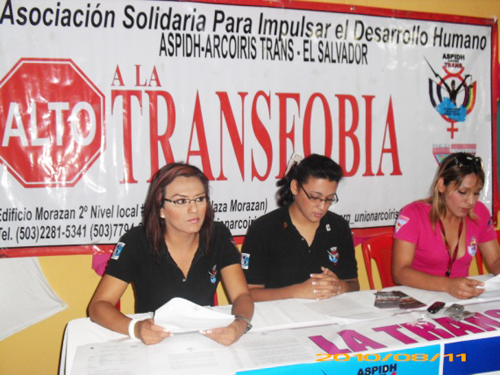Strategies
1. Build competence among healthcare providers on trans-related health issues
2. Educate trans individuals on their rights, their health, HIV and sexual health issues, including their right to access discrimination-free healthcare
3. Advocate to foster the cultural awareness and acceptance of trans individuals
In 1999, El Salvador’s government denied The Asociación Solidaria Para Impulsar el Desarrollo Humano’s (ASPIDH) first application for legal NGO status simply because it was an organization for trans individuals. ASPIDH promptly sued for discrimination, and then proceeded to lead the fight for legal recognition of trans rights. In 2009, ASPIDH became the country’s first legally recognized trans organization. The same year the government issued a decree that all LGBT individuals have the right to access healthcare.

ASPIDH members at a booth advocating for trans healthcare rights. (Photo: ASPIDH)
Despite this progress, the extreme legal and cultural marginalization of the trans community continues, and this ongoing discrimination has high health-related costs. The HIV rate in the general population in El Salvador is estimated to be 0.6 percent, however it is 10 percent among men who have sex with men (MSM). Among trans women, who until recently were not acknowledged or targeted in any government HIV efforts, the estimated rate is 20–25 percent. “We trans people in El Salvador live in a context of vulnerability where discrimination, lack of access to jobs, and lack of access to health services, information, and resources has not permitted the national HIV response to have an impact in our community,” says Edwin Paty Hernandez, ASPIDH’s technical advisor.
ASPIDH now regularly makes presentations to the Ministry of Public Health about how the government can better accommodate the needs of the trans community and reduce its high HIV burden. But trans women in El Salvador are still often discriminated against in healthcare settings, either by being denied care outright or humiliated in other ways. For example, they can be called by their male name in front of a crowd. This inhibits many trans individuals from getting tested for HIV and accessing other healthcare services they need. Hernandez and ASPIDH’s team of volunteers and employees are dedicated to challenging this discrimination one healthcare center at a time.
“I was not going to the health centers before because
it was a painful experience,” says Erika, a trans woman and fifteen-year
veteran of the sex trade who had not had an HIV test in over five years when
she found ASPIDH and got tested.
ASPIDH’s Open Road Project, funded by amfAR, builds competence in health workers to serve trans individuals’ health needs. It offers a month-long series of workshops, and then issues “Transphobia-free” certificates to health centers with trans-competent staff. ASPIDH also distributes educational literature at participating health centers, as well as online via Facebook and Twitter and other social networking sites. So far, hundreds of healthcare workers have completed the series and several hospitals have been certified as trans-friendly.
ASPIDH was founded in 1996 by two trans sex workers who were tired of facing government-sanctioned discrimination and rampant, often violent, abuse from police. These two individuals decided to advocate for their rights. While their mission has since expanded, the basic premise of ASPIDH as a “for trans/by trans” organization remains. Because it is of the community, ASPIDH continues to be successful in reaching trans women, who are so accustomed to discrimination that they often shy away from non-trans outreach workers.
Trans women in El Salvador are often denied formal education, forced from their homes, and denied job opportunities based on their gender identity. In 2008, over 90 percent of trans women surveyed in an ASPIDH-led study reported resorting to sex work to earn a living, with 40 percent reporting they had done so in the last year, which greatly contributes to their high risk for HIV acquisition. ASPIDH members conduct outreach in the streets, both in sex work hot spots and other areas, to find at-risk trans individuals and educate them about their rights and health, including HIV prevention.
The outreach workers also encourage the trans women to attend workshops in the ASPIDH drop-in center, which was established with support from amfAR. The center serves both as a safe social space where trans individuals can be themselves and as a place for support groups and workshops. Many visitors report that before visiting the center, they had no trans identity and no sense of ‘community.’ After discovering ASPIDH, they report having new-found knowledge and a community that empowers them to demand their rights to healthcare and equal treatment. If an individual does not feel comfortable facing the health system alone, an ASPIDH employee will accompany them to one of their trans-friendly centers to ensure the experience is discrimination-free.
“I was not going to the health centers before because it was a painful experience,” says Erika, a trans woman and fifteen-year veteran of the sex trade who had not had an HIV test in over five years when she found ASPIDH and got tested. “Erika can now go to the health centers without fear,” says Hernandez.